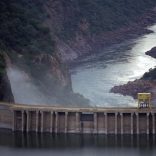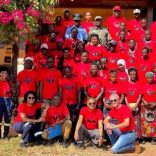Mozambique: HCB seeks partners for its northern power plant and solar power plant
Mozambique: Gas is country’s chance to make poverty go down in history – analyst

File photo: DW
- A researcher at the Centre for Democracy and Development (CDD), Américo Maluana, argues that Mozambique should use its gas resources to increase access to electricity, currently available to just 40% of the population.
The opportunities and challenges of the energy transition in Mozambique were discussed last week in Maputo, at an event promoted by the Centre for Democracy and Development (CDD).
In an interview with DW Africa, CDD researcher Américo Maluana said that gas was a bridge for the country’s energy transition, since, in the “framework of fossil fuels, it presents itself as a relatively clean source of energy when compared to others”.
For Maluana, it is imperative that Mozambique “use the experience of coal exploitation so as not to repeat the same mistakes”, because, he stresses, “coal did not promote the development that was expected”. Now, the researcher says, gas “is the only chance that Mozambique has to open a new page towards development”.
DW Africa: Is gas the bridge to the energy transition in Mozambique?
Américo Maluana (AM): Gas turns out to be a bridge for the energy transition in Mozambique, because there is a double dimension that must be looked at. What we see is that, in the context of fossil fuels, gas presents itself as a relatively clean source of energy compared to other sources.
DW Africa: Gas is still considered a “clean energy”, but it may stop being considered as such… In this context, should Mozambique channel the gains from the exploitation of this resource to the production of renewable energy?
AM: Yes, that’s a good option, because the fossil fuel exploitation window tends to get narrower, which means that the country is challenged to make increasingly strategic decisions, so that the energy transition agenda does not compromise the country’s development goals. This necessarily involves, for example, using the revenues from gas to increase the level of expansion and access to electricity.
We are discussing the energy transition in a context of precariousness, in which a significant part of the population – around 60% – does not have access to electricity. The energy transition must follow an inclusive logic, in the sense of leaving no one behind. This necessarily involves creating conditions for gas to serve as a mechanism for the country’s industrialisation.
DW Africa: At last week’s event, the Mozambican government ruled out, for the time being, the renunciation of coal exploration. Do you agree that the conditions for this waiver are not yet created?
AM: It’s a challenge and it’s an issue linked to the commitment to the country’s development in recent years.
What I can highlight is the need for the country to use the experience of coal exploitation, precisely so as not to repeat the same mistakes that marked this process in the forthcoming process of natural gas exploration.
Regarding coal, there were high expectations for development. But what turns out is that coal did not promote the development that was expected. Now, it is the least desirable fossil fuel internationally.
As much as the country is reluctant to abandon coal, the international market – due to ambitious policies and climate targets – will reduce the gains it makes from coal mining.
Gas is the last chance that Mozambique has to reduce poverty historically and open a new page towards development.
DW Africa: What are the main findings of the CDD report on the perception of energy transition in Pemba? How is the population receiving the debate on this topic at a time when there are still so many Mozambicans without access to energy?
AM: What we found, in general, is that there is a low level of knowledge about issues related to the energy transition. The humanitarian context in Pemba gives us higher priorities, which leads us to conclude that the energy transition is not necessarily a priority for citizens.
The energy transition is irreversible. Adoption of a national policy or strategy is required. A strategic decision that would be fundamental in this macroeconomic planning process would be to use gas revenues to expand access to energy, and address the imbalances in energy access.
Huge income is expected. The Bank of Mozambique estimates around US$96 billion from the exploitation of these resources. These are revenues that can help in this process.
On the other hand, it is necessary to use gas to produce energy. In relation to this aspect, we already have the advantage in Mozambique that the law itself requires that at least 25% of the gas produced is for the domestic market. However, there is that prerogative that this portion must be made available only if the projects to consume these resources exist. Therefore, the country needs to prepare even more to face these challenges.
Source: Deutsche Welle













Leave a Reply
Be the First to Comment!
You must be logged in to post a comment.
You must be logged in to post a comment.